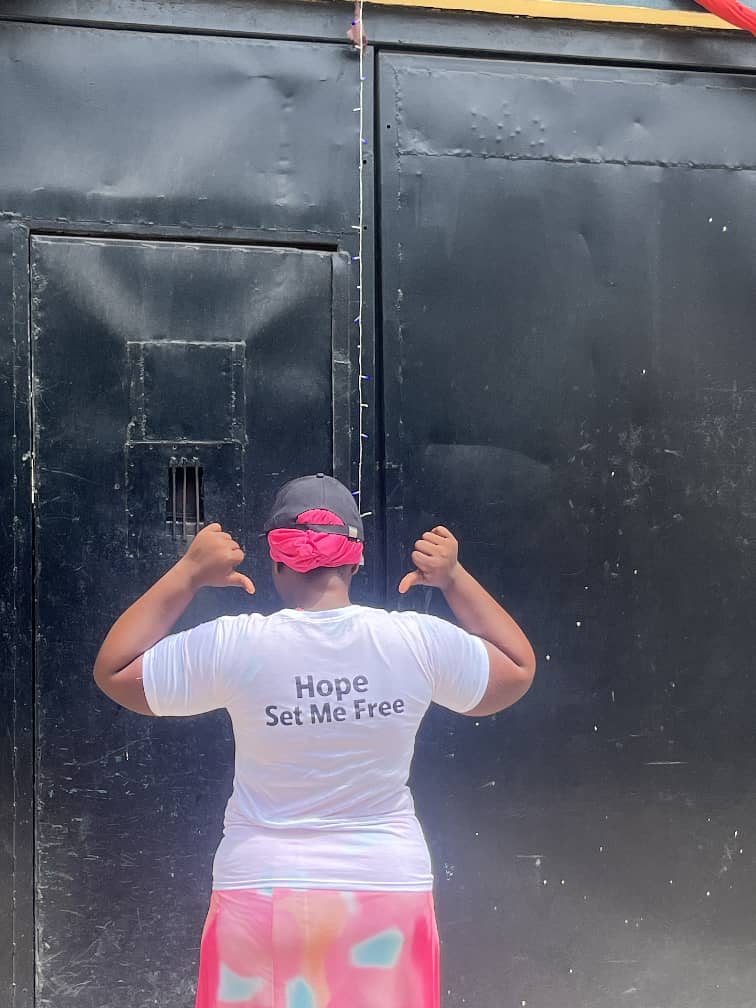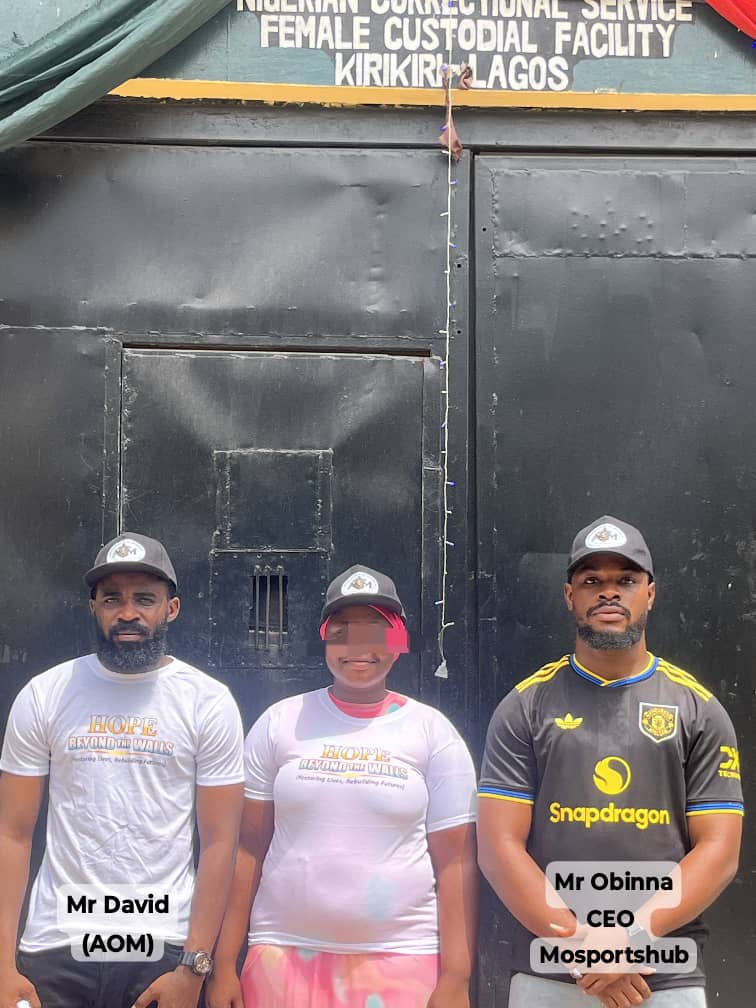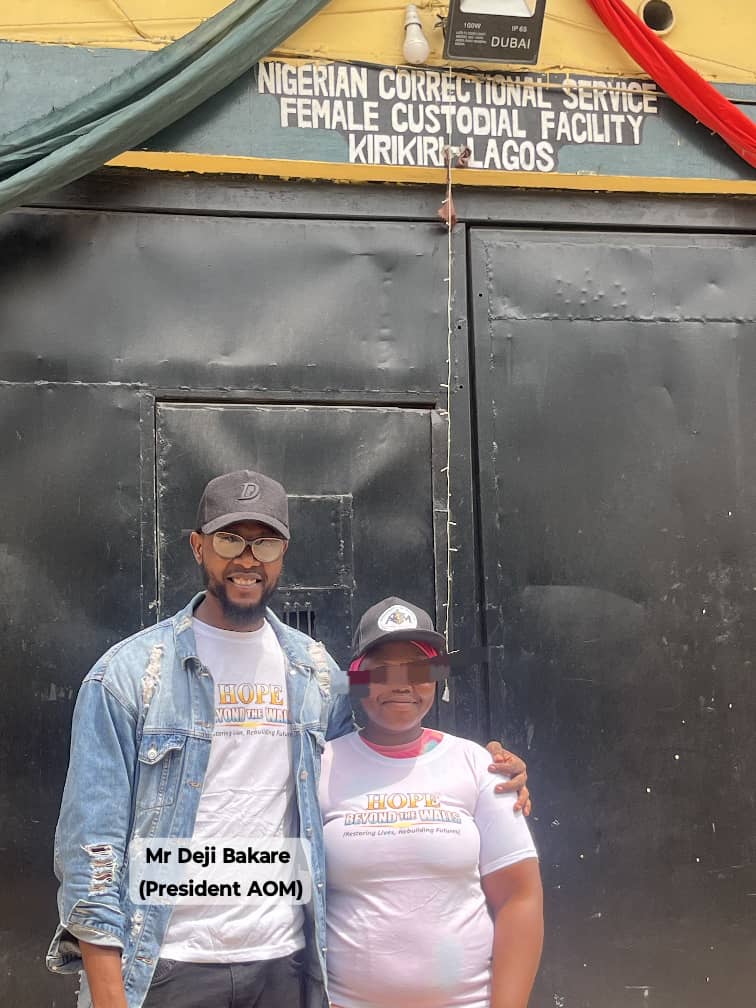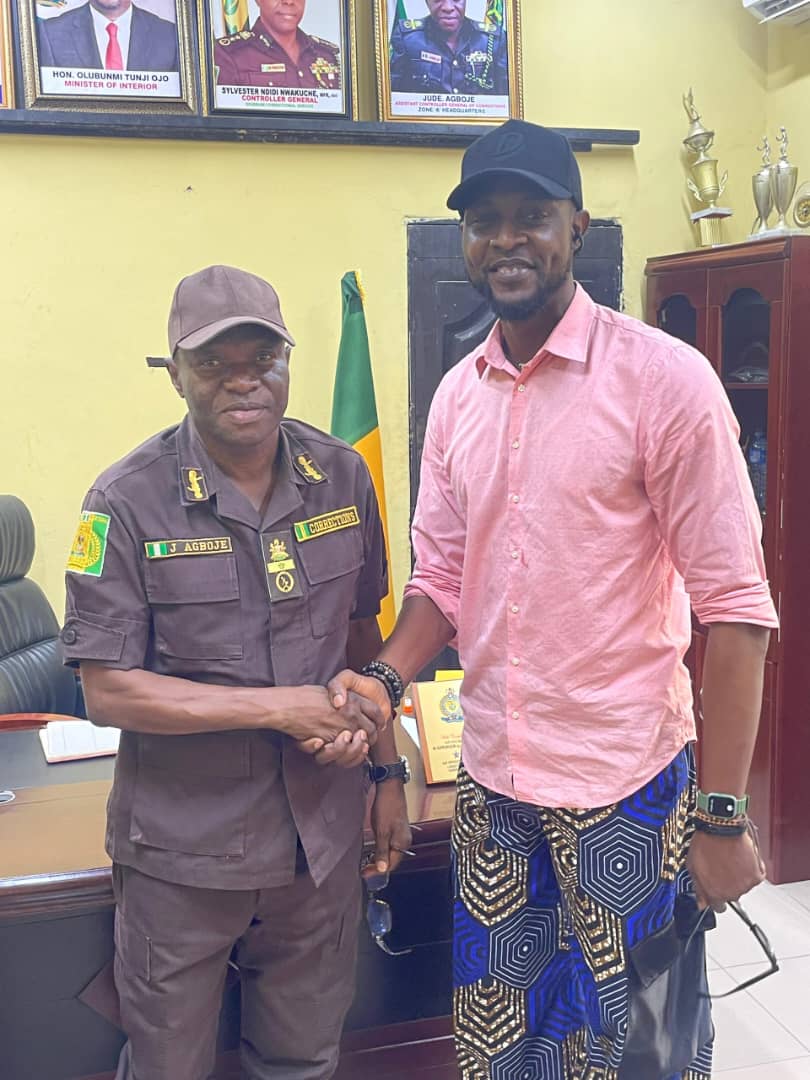society
10 States Battling Flooding, 21 Others At Risk
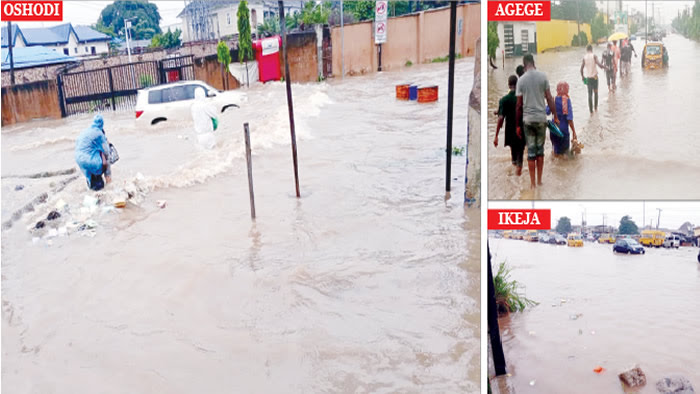
10 States Battling Flooding, 21 Others At Risk
The Federal Government, on Thursday, said no fewer than 10 states and the Federal Capital Territory, Abuja, had either experienced various degrees of flooding or recorded casualties as rains intensified.
The Minister of Water Resources and Sanitation, Prof Joseph Utsev, who dropped the red alert during a press briefing in Abuja, warned that 21 more states might suffer flooding.
He stated this against the background of the Wednesday downpour which grounded business and commercial activities in Lagos and Ogun states.
The resulting flooding brought down a two-storey building in the Mushin area of Lagos and overwhelmed residents while pupils could not attend schools in parts of the state.
Also, a pupil was swept away by the flooding in the Ketu area of Lagos.
Utsev explained that the Annual Flood Outlook by the Nigeria Hydrological Services Agency released in April had predicted that 148 local government areas in 31 states fell within the high flood risk areas.
The affected states include Adamawa, Akwa Ibom, Anambra, Bauchi, Bayelsa, Benue, Borno, Cross River, Delta, Ebonyi, Edo, Imo, Jigawa, Kaduna, Kano, Katsina and Kebbi.
Others are Kogi, Kwara, Lagos, Nasarawa, Niger, Ogun, Ondo, Osun, Oyo, Plateau, Rivers, Sokoto, Taraba and Yobe.
Cholera may spread
The minister warned that cholera might spread further in Nigeria due to the flooding.
He further stated that river flooding would begin this month, and would hit Ondo, Kaduna, Anambra, Benue, Adamawa and 12 other states
According to him, out of the 31 states where the Annual Flood Outlook predicted would experience flooding, the incident had occurred in 10.
Providing a national update on flooding, Utsev said, “It should be noted that some states have started experiencing varying levels of flooding and its associated disasters as early as April this year.
“So far, more than 10 states of the federation and the FCT have experienced one degree of flooding or the other with several casualties recorded including displacement of people and loss of property.
At this point, it is important to state that river flooding is expected, beginning this month (July 2024). The states that are likely to be impacted by this as predicted are Akwa Ibom, Anambra, Adamawa, Benue, Bayelsa, Cross River, Delta, Edo, Jigawa, Kogi, Kebbi, Kaduna, Niger, Nasarawa, Ondo, Ogun, Rivers, Taraba and the FCT,” Utsev stated.
The minister recalled that in April 2024, he presented to the general public the 2024 Annual Flood Outlook by the Nigeria Hydrological Services Agency, an agency under his supervision.
The agency has the responsibility for the provision of information on flood forecasts and alerts and monitoring of all the major rivers in Nigeria, including the trans-boundary Rivers Niger and Benue.
“The AFO shows that 148 LGA in 31 states fall within the High Flood Risk areas, while 249 LGA fall within the Moderate Flood Risk areas with the remaining 377 LGA falling within the Low Flood Risk areas.
The high flood risk states as predicted are Adamawa, Akwa-Ibom, Anambra, Bauchi, Bayelsa, Benue, Borno, Cross-River, Delta, Ebonyi, Edo, Gombe, Imo, Jigawa, Kaduna, Kano, Kebbi, Kogi, Kwara, Lagos, Nasarawa, Niger, Ogun, Ondo, Osun, Oyo, Rivers, Sokoto, Taraba, Yobe, Zamfara and the FCT,” Utsev stated.
The minister pointed out that Nigeria is located within the River Niger Basin which is occupied by eight other countries including Benin, Burkina Faso, Cameroun, Chad, Cote D’ Ivoire, Guinea, Mali and Niger.
“The country is at the lowest portion of the basin. This means that once the upper catchment of the basin gets flooded, Nigeria should be prepared to experience flooding incidents. It is important to note that the month of June 2024 signifies the beginning of hydrological year 2024/2025 in the Niger Basin.
The flow situation within the catchment is currently within normal as the rising water levels at our various monitoring stations in Niamey are still within acceptable levels.
“The flow situation at Jiderebode in Kebbi State upstream of Kainji and Jebba reservoirs which is the first monitoring station on the River Niger in Nigeria is still at the normal situation. The same applies to the flow at Lokoja, Kogi State (the confluence of Rivers Niger and Benue).
“We are also monitoring the development on the River Benue Sub-Basin. Here, Wuroboki in Adamawa State is our first monitoring station where the flow from the upstream Cameroun is received. The flow situation at Wuroboki is relatively normal at this time, so there is no cause for alarm in terms of water releases in the Benue River basin.
The Lagdo Dam operators have informed us that they are currently filling the dam for hydropower generation. However, we will keep monitoring the development on this flank and put close tabs on other monitoring stations as we are approaching the critical months,” he stated.
The Director-General of NIHSA, Clement Nze, underscored the Federal Government’s advisory role, noting that enforcement and local action fell under the states’ jurisdiction.
He said the central government would continue its efforts to construct buffer dams alongside the Lagdo Dam in Cameroon, to mitigate flood risks. A senior police officer at the Ketu Division, who was not authorised to speak to the media, confirmed the tragedy.
The officer said, “It is a sad occurrence. Though the matter was not officially reported, we got wind of the incident and sympathised with the family.”
In another development, a resident in the Aguda area of Lagos identified only as Aluta Mama, told our correspondent that some of her home appliances were submerged.
She added that she and her family members had to leave their home pending the time the flood would abate.
“The impact is heavy. We had to leave home for the flood to subdue. Some of my properties and appliances were submerged in the flood,” Aluta Mama said.
Another resident in the Pen Cinema area of Agege, Lagos State, Anuoluwapo Atanda, disclosed that though she was not affected by the flooding because she lived in a storey building, it affected those living on the ground floor of her house.
“My house is a storey building so the occupants upstairs were not affected but those downstairs woke up to the flooding in their room so they were unable to protect their valuables. Everywhere flooded’
She said, “As I speak, we are still cleaning everywhere with rags because the flood is still flowing. The flood dug a passage in my toilet and started flowing in, so we repaired the spot this morning to curb that.
“Most residents are indoors because the flood has overtaken the road. My family cannot step out of the house and a lot of electronic appliances are now bad.
“There is a woman beside our house whose fence collapsed under the intensity of the flooding. Whenever there is a downpour, we are always in a panic mode but this time, the flood was worse because it affected everyone. We have been finding it hard to cope with the messy situation,” Ojelana said. On Thursday, the Special Adviser on Environment to the Lagos State Government, Olakunle Rotimi-Akodu, urged residents in low-land areas and other parts of the state to register with the Lagos State Residents Registration Agency.
Akodu, in an interview with one of our correspondents, maintained that such data would be useful in emergencies.
He said although the government had not set up a temporary shelter or camp for the flood victims, it was still important for them to immediately relocate to upland areas.
society
Viral “Chat With God” Claim Targeting Kenyan Prophet David Owuor Proven False

Viral “Chat With God” Claim Targeting Kenyan Prophet David Owuor Proven False
By George Omagbemi Sylvester, SaharaWeeklyNG
“Viral screenshot sparks national controversy as the Ministry of Repentance and Holiness dismisses fabricated “divine” WhatsApp exchange, raising urgent questions about faith, digital misinformation, and religious accountability in Kenya.”
A sensational social media claim that Kenyan evangelist Prophet Dr. David Owuor displayed a WhatsApp conversation between himself and God has been definitively debunked as misinformation, sparking national debate over digital misinformation, religious authority and faith-based claims in Kenya.
On February 18–19, 2026, an image purporting to show a WhatsApp exchange between a deity and Prophet Owuor circulated widely on Twitter, Facebook, WhatsApp groups and TikTok. The screenshot, allegedly shared during one of his sermons, was interpreted by many as illustrating unprecedented direct communication with the divine delivered through a mainstream messaging platform; a claim that, if true, would have broken new ground in how religious revelation is understood in contemporary society.
However, this narrative quickly unraveled. Owuor’s Ministry of Repentance and Holiness issued an unequivocal public statement calling the image “fabricated, baseless and malicious,” emphasizing that he has never communicated with God through WhatsApp and has not displayed any such digital conversation to congregants. The ministry urged the public and believers to disregard and stop sharing the image.
Independent analysis of the screenshot further undermined its credibility: timestamps in the image were internally inconsistent and the so-called exchange contained chronological impossibilities; clear indicators of digital fabrication rather than an authentic conversation.
This hoax coincides with rising scrutiny of Owuor’s ministry. Earlier in February 2026, national broadcaster TV47 aired an investigative report titled “Divine or Deceptive”, which examined alleged “miracle healing” claims associated with Owuor’s crusades, including assertions of curing HIV and other chronic illnesses. Portions of that investigation suggested some medical documentation linked to followers’ health outcomes were fraudulent or misleading, intensifying debate over the intersection of faith and public health.
Credible faith leaders have weighed in on the broader context. Elias Otieno, chairperson of the National Council of Churches of Kenya (NCCK), recently urged that “no religious leader should replace God or undermine medicine,” affirming a widely accepted Christian understanding that divine healing does not supplant established medical practice. He warned against unverified miracle claims that may endanger lives if believers forego medical treatment.
Renowned communications scholar Professor Pippa Norris has noted that in digital societies, “religious authority is increasingly contested in the public sphere,” and misinformation (intentional or accidental) can quickly erode trust in both religious and secular institutions. Such dynamics underscore the importance of rigorous fact-checking and responsible communication, especially when claims intersect profoundly with personal belief and public well-being.
In sum, the viral WhatsApp chat narrative was not a revelation from the divine but a striking example of how misinformation can exploit reverence for religious figures. Owuor’s swift repudiation of the false claim and broader commentary from established church bodies, underline the ongoing challenge of balancing deeply personal faith experiences with the evidence-based scrutiny necessary in a digitally connected world.
society
HOPE BEYOND THE WALLS 2026: ASSOCIATION OF MODELS SUCCESSFULLY SECURES RELEASE OF AN INMATE, CALLS FOR CONTINUED SUPPORT

HOPE BEYOND THE WALLS 2026: ASSOCIATION OF MODELS SUCCESSFULLY SECURES RELEASE OF AN INMATE, CALLS FOR CONTINUED SUPPORT
The Association of Models (AOMNGO) proudly announces the successful completion of the first edition of Hope Beyond the Walls 2026, a humanitarian initiative dedicated to restoring hope and freedom to deserving inmates.
Despite enormous challenges, financial pressure, emotional strain, and operational stress, the organization remained committed to its mission. Through perseverance, faith, and collective support, one inmate has successfully regained freedom a powerful reminder that hope is stronger than circumstance.
This milestone did not come easily.
Behind the scenes were weeks of coordination, advocacy, fundraising, documentation, and intense engagement. There were moments of uncertainty, but the determination to give someone a second chance kept the vision alive.
Today, the Association of Models gives heartfelt appreciation to all partners and sponsors, both locally and internationally, who stood with us mentally, financially, morally, and physically.
Special Recognition and Appreciation To:
Correctional Service Zonal Headquarters Zone A Ikoyi
Esan Dele
Ololade Bakare
Ify
Kweme
Taiwo & Kehinde Solagbade
Segun
Mr David Olayiwola
Mr David Alabi
PPF Zion International
OlasGlam International
Razor
Mr Obinna
Mr Dele Bakare (VOB International)
Tawio Bakare
Kehinde Bakare
Hannah Bakare
Mrs Doyin Adeyemi
Shade Daniel
Mr Seyi United States
Toxan Global Enterprises Prison
Adeleke Otejo
Favour
Yetty Mama
Loko Tobi Jeannette
MOSES OLUWATOSIN OKIKIADE
Moses Okikiade
(Provenience Enterprise)
We also acknowledge the numerous businesses and private supporters whose names may not be individually mentioned but whose contributions were instrumental in achieving this success.
Your generosity made freedom possible.
A CALL TO ACTION
Hope Beyond the Walls is not a one-time event. It is a movement.
There are still many deserving inmates waiting for a second chance individuals who simply need financial assistance, legal support, and advocacy to reunite with their families and rebuild their lives.
The Association of Models is therefore calling on:
Corporate organizations
Local and international sponsors
Philanthropists
Faith-based organizations
Community leaders
Individuals with a heart for impact
to partner with us.
Our vision is clear:
To secure the release of inmates regularly monthly, quarterly, or during special intervention periods through structured support and transparent collaboration.
HOW TO SUPPORT
Interested partners and supporters can reach out via
Social Media: Official Handles Hope In Motion
Donations and sponsorship inquiries are welcome.
Together, we can turn difficult stories into testimonies of restoration.
ABOUT AOMNGO
The Association of Models (AOMNGO) is a humanitarian driven organization committed to advocacy, empowerment, and social impact. Through projects like Hope Beyond the Walls, the organization works tirelessly to restore dignity and create opportunities for individuals seeking a second chance.
“When we come together, walls fall and hope rises.”
For media interviews, partnerships, and sponsorship discussions, please contact the Association of Models directly.
society
SENATOR ADEOLA YAYI REGISTERS 4000 JAMB CANDIDATES

SENATOR ADEOLA YAYI REGISTERS 4000 JAMB CANDIDATES
In continuation of his educational support initiatives and following established tradition, Senator Solomon Adeola (APC,Ogun West) has successfully paid for and enrolled 4000 indigent students for the 2026 Joint Admission Matriculation Board(JAMB) examination.
According to a release e-signed and made available to members of the League of Yewa-Awori Media Practitioners (LOYAMP) by High Chief Kayode Odunaro, Media Adviser to Senator Adeola and shared with (your mediu), the programme financed by the senator under the “SEN YAYI FREE JAMB 2026” ended on Saturday , February 21, 2026, with a total of 4000 candidates successfully enrolled with their PINs provided.
Commenting on the success of the programme, Senator Adeola said the programme is another leg of his personal educational empowerment for indigent but brilliant citizens preparatory to his scholarship and bursary facilitation for tertiary education institutions’ students.
“As far as I can help it, none of our children will miss educational opportunities arising out of adverse economic predicament of their parents or guardians”, he stated.
Successful candidates cut across all the three senatorial districts of Ogun State with 2183 coming from Ogun West, 1358 coming from Ogun Central and 418 from Ogun East.
Some of the candidates that applied and are yet to get their PINs due wrong information supplied in their profiles and being underage as discovered by JAMB and other reasons are being further assisted to see the possibility of getting their PINs.
The Free JAMB programme of the Senator that has been running for years is well received by appreciative beneficiaries and their parents.
Alhaji Suara Adeyemi from Ipokia Local Government whose daughter successfully got her PIN in the programme said the Senator’s gesture was a welcome financial relief for his family at this period after payment of numerous school fees of other siblings of the beneficiary seeking admission to higher institution.
Also posting on the social media handle of the Senator, a beneficiary Mr. Henry Olaitan, from Odeda LGA said that he would have missed doing the entry examination as his guardian cannot afford the fees for himself and two of his children.
-

 celebrity radar - gossips6 months ago
celebrity radar - gossips6 months agoWhy Babangida’s Hilltop Home Became Nigeria’s Political “Mecca”
-

 society6 months ago
society6 months agoPower is a Loan, Not a Possession: The Sacred Duty of Planting People
-

 society5 months ago
society5 months agoReligion: Africa’s Oldest Weapon of Enslavement and the Forgotten Truth
-

 news6 months ago
news6 months agoTHE APPOINTMENT OF WASIU AYINDE BY THE FEDERAL GOVERNMENT AS AN AMBASSADOR SOUNDS EMBARRASSING








